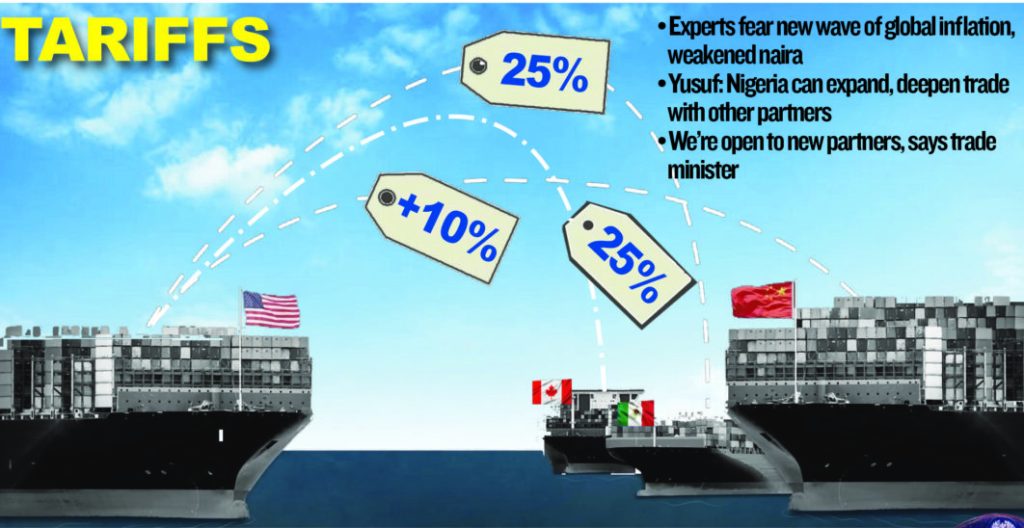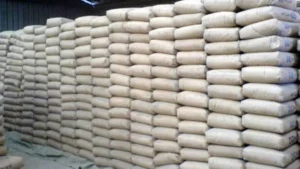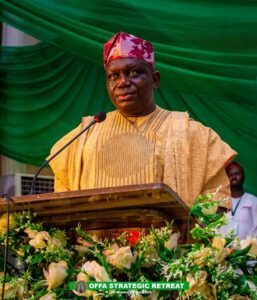
• AfCFTA, Local Manufacturing Face New Challenges as China Seeks Alternative Markets
Nigeria and the broader African market may soon experience significant economic shifts as the ongoing tariff war between the United States and its top trading partners—Canada, China, and Mexico—intensifies.
While experts remain divided on how this geopolitical tussle will affect African economies, Nigeria, one of 48 nations with a trade deficit with the U.S., may not remain a passive observer. Former U.S. President Donald Trump, who previously pushed for a reduction in the U.S. trade deficit under his “America First” agenda, has reinforced his stance by imposing tariffs of 10% to 25% on imports from Canada, Mexico, and China. These countries have already responded with retaliatory measures, sparking concerns of broader economic consequences.
Nigeria, once known for its neutral stance on global economic conflicts, has begun to realign its trade partnerships. The country recently joined BRICS+, a move that positions it alongside China, a nation actively challenging the dominance of the U.S. dollar in global trade. With China facing increasing trade restrictions from the U.S., there are growing fears that it will turn its focus more aggressively toward African markets, where Nigeria serves as a critical gateway.
China’s push into Africa could pose a major challenge to Nigerian manufacturers, who already struggle with high production costs due to poor infrastructure and expensive energy. Increased Chinese imports could make competition even tougher for local businesses, potentially undermining Nigeria’s efforts to strengthen domestic manufacturing under initiatives like the African Continental Free Trade Area (AfCFTA).
Despite its ambitious objectives, AfCFTA has remained largely inactive since its launch four years ago. Without a robust framework for protecting local industries, Nigerian manufacturers could find themselves overwhelmed by an influx of cheaper foreign goods, further hampering economic diversification.
In the first nine months of 2024, Nigeria recorded a trade surplus with the U.S., exporting approximately $5.29 billion worth of goods while importing $3.88 billion. This resulted in a positive trade balance of $1.4 billion. The total trade volume as of September 2024 stood at $9.1 billion, reflecting an increase from $8.27 billion in 2023, when Nigeria also maintained a surplus of $3.1 billion.
However, if Trump escalates his trade policies, Nigeria’s favorable trade balance with the U.S. could be jeopardized. More concerning is the likelihood that the global trade war will drive inflation and maintain high interest rates, which could have serious repercussions for Nigeria’s economy.
A prolonged high-interest rate environment in developed economies could reduce capital inflows into emerging markets like Nigeria. In recent months, Nigeria has seen improved capital inflows, contributing to relative stability in its foreign exchange (FX) market. However, an outflow of capital due to rising U.S. interest rates could trigger another round of currency depreciation and economic uncertainty.
In response to U.S. tariffs, Canada has imposed a 25% tariff on U.S. imports worth C$155 billion. Mexico has reached a temporary agreement with the U.S. to suspend tariffs for one month, while China has announced countermeasures that could impact the electronics and apparel industries.
Dr. Muda Yusuf, CEO of the Centre for the Promotion of Private Enterprise (CPPE), highlights three key dimensions of the current trade war’s impact: trade, investment, and currency valuation.
“As the affected countries seek new trading partners, Nigeria could explore opportunities to expand its trade relationships. Businesses that export to the U.S. may benefit from trans-shipment strategies, where products are rerouted through third-party countries. Additionally, new investment opportunities could arise as businesses look for alternative sourcing and production locations,” Yusuf explained.
At the same time, he warned of a broader disruption in global supply chains, estimated at $36 billion, which could drive up the cost of goods and raw materials. This could further fuel inflation in Nigeria, particularly for imported machinery, spare parts, and other essential products.
Minister of Industry, Trade, and Investment, Dr. Jumoke Oduwole, downplayed concerns about the potential economic fallout from the trade war, asserting that Nigeria remains open to partnerships with both longstanding and emerging allies.
“For us, it’s Nigeria first, Africa first. We view this situation as an opportunity rather than a threat. We are listening closely to the offers from both old and new partners,” Oduwole stated.
Economist Dr. Vincent Nwani also dismissed fears of a major spillover effect on Nigeria’s local market. He argued that the country’s poor business environment—rather than external trade policies—remains the biggest obstacle to economic growth.
“Even if China increases its trade with Africa, Nigeria won’t suddenly have more money to buy goods. Our manufacturing sector already faces significant challenges, and the real issue is fixing our business environment—ensuring stable power supply, improving infrastructure, and securing supply chains. Without these, we can’t fully benefit from any global trade shifts,” Nwani said.
He also cautioned against overestimating the significance of AfCFTA, stating that trade within Africa remains largely bilateral rather than multilateral.
While the global trade war presents both risks and opportunities, experts agree that Nigeria’s primary focus should be on addressing its internal economic challenges. Poor infrastructure, inefficient logistics, and regulatory bottlenecks continue to hinder trade within the country and across African borders.
Dr. Nwani emphasized that Nigeria has a trillion-dollar market with over 200 million consumers, yet basic trade infrastructure remains inadequate.
“Before worrying about global trade dynamics, we need to ensure that businesses can seamlessly move goods across Nigeria and within Africa. The inability to transport goods efficiently by rail, land, or sea is a bigger concern than tariff wars in far-off economies,” he concluded.
The U.S.-China-Canada-Mexico trade war is poised to reshape global commerce, and Nigeria will inevitably feel some of its effects. However, whether Nigeria emerges as a winner or a loser depends largely on its ability to strengthen local industries, enhance trade infrastructure, and create a more investor-friendly environment. Without these foundational changes, Nigeria may struggle to capitalize on the shifting global trade landscape.









